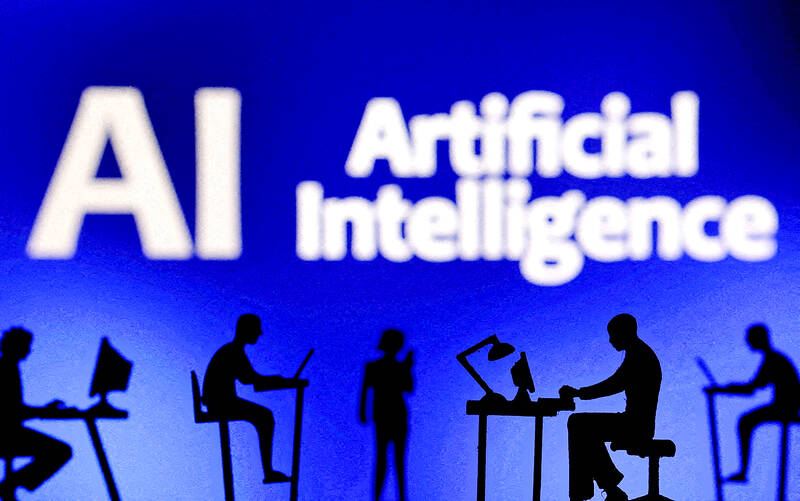The rate of businesses in the US using artificial intelligence (AI) is still relatively small, but it is growing rapidly, with firms in information technology, and in places such as Colorado and Washington, leading the way, a new paper from US Census Bureau researchers said.
Overall use of AI tools by companies in the production of goods and services rose from 3.7 percent last fall to 5.4 percent in February, and it is expected to rise in the US to 6.6 percent by early fall, the bureau said in its Business Trends and Outlook Survey, which was released this spring.
The use of AI by firms is still rather small because many businesses have not yet seen a need for it, census bureau researchers said in an accompanying paper.

Photo: Reuters
“Many small businesses, such as barber shops, nail salons or dry cleaners, may not yet see a use for AI, but this can change with growing business applications of AI,” they said. “One potential explanation is the current lack of AI applications to a wide variety of business problems.”
Few firms utilizing AI tools reported laying off workers because of it. Instead, many businesses that use AI were expanding compared with other firms.
They also were developing new work flows, training staff on the technology and purchasing related services, the researchers said.
The rate of AI use among business sectors varied widely, from 1.4 percent in construction and agriculture to 18.1 percent in information technology.
Larger firms were more likely to be using the technology than small and medium-sized firms, but the smallest firms used it more than medium-sized businesses, the researchers said.
The type of work AI was used for the most included marketing tasks, customer service chatbots, getting computers to understand human languages, text and data analytics and voice recognition.
Erik Paul, chief operating officer of a software development company in Orlando, Florida, has been using AI tools for about a year to generate images for marketing materials, help write compliance paperwork and compare versions of documentation for products.
“It has become an integral part of our day, but the problem is, you can’t trust it,” Paul said on Thursday.
“You can never blindly copy and paste. Sometimes the context gets thrown off and it throws in erroneous details that aren’t helpful or change the tone of the topic you are writing about,” he added.
The two places with the US’ highest AI use by firms, Colorado and Washington, had adoption rates of 7.4 percent and 7.2 percent respectively.
Not far behind those were Florida, Delaware, California and Washington State.
Mississippi had the smallest AI use with 1.7 percent of firms.
The survey showed some ambivalence among firms about whether they would adopt AI to their businesses in the near future or continue using it.
Two-thirds of firms not yet using AI reported that they expect to remain non-users, while 14 percent not yet using the technology were unsure if they would do so down the road.
About 14 percent of current users reported that they did not expect to continue utilizing AI in the near future, “potentially indicating some degree of ongoing experimentation or temporary use that may result in de-adoption,” the researchers said.

GROWING OWINGS: While Luxembourg and China swapped the top three spots, the US continued to be the largest exposure for Taiwan for the 41st consecutive quarter The US remained the largest debtor nation to Taiwan’s banking sector for the 41st consecutive quarter at the end of September, after local banks’ exposure to the US market rose more than 2 percent from three months earlier, the central bank said. Exposure to the US increased to US$198.896 billion, up US$4.026 billion, or 2.07 percent, from US$194.87 billion in the previous quarter, data released by the central bank showed on Friday. Of the increase, about US$1.4 billion came from banks’ investments in securitized products and interbank loans in the US, while another US$2.6 billion stemmed from trust assets, including mutual funds,

Micron Memory Taiwan Co (台灣美光), a subsidiary of US memorychip maker Micron Technology Inc, has been granted a NT$4.7 billion (US$149.5 million) subsidy under the Ministry of Economic Affairs A+ Corporate Innovation and R&D Enhancement program, the ministry said yesterday. The US memorychip maker’s program aims to back the development of high-performance and high-bandwidth memory chips with a total budget of NT$11.75 billion, the ministry said. Aside from the government funding, Micron is to inject the remaining investment of NT$7.06 billion as the company applied to participate the government’s Global Innovation Partnership Program to deepen technology cooperation, a ministry official told the

Taiwan Semiconductor Manufacturing Co (TSMC, 台積電), the world’s leading advanced chipmaker, officially began volume production of its 2-nanometer chips in the fourth quarter of this year, according to a recent update on the company’s Web site. The low-key announcement confirms that TSMC, the go-to chipmaker for artificial intelligence (AI) hardware providers Nvidia Corp and iPhone maker Apple Inc, met its original roadmap for the next-generation technology. Production is currently centered at Fab 22 in Kaohsiung, utilizing the company’s first-generation nanosheet transistor technology. The new architecture achieves “full-node strides in performance and power consumption,” TSMC said. The company described the 2nm process as

JOINT EFFORTS: MediaTek would partner with Denso to develop custom chips to support the car-part specialist company’s driver-assist systems in an expanding market MediaTek Inc (聯發科), the world’s largest mobile phone chip designer, yesterday said it is working closely with Japan’s Denso Corp to build a custom automotive system-on-chip (SoC) solution tailored for advanced driver-assistance systems and cockpit systems, adding another customer to its new application-specific IC (ASIC) business. This effort merges Denso’s automotive-grade safety expertise and deep vehicle integration with MediaTek’s technologies cultivated through the development of Media- Tek’s Dimensity AX, leveraging efficient, high-performance SoCs and artificial intelligence (AI) capabilities to offer a scalable, production-ready platform for next-generation driver assistance, the company said in a statement yesterday. “Through this collaboration, we are bringing two